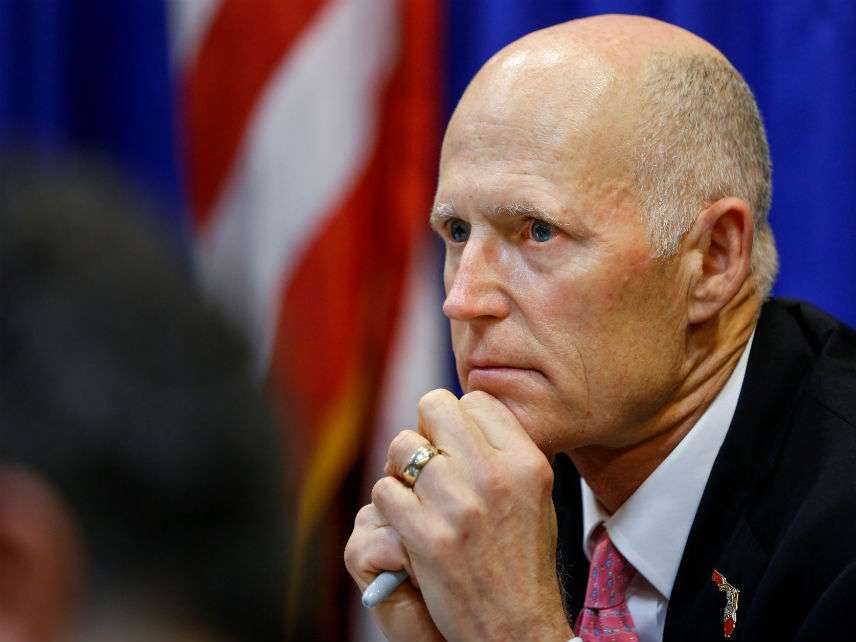Florida Gov. Rick Scott Calls for New Gun Controls, More Cops in Schools
In the aftermath of the Parkland shooting.
Florida Gov. Rick Scott, a Republican, today announced a legislative agenda in response to the massacre at a high school in Parkland, Florida.

His plan includes new restrictions aimed at:
• Those who other people think of as dangerous. "I want to create a new program in Florida—I call it the Violent Threat Restraining Order," Scott said. "This will allow a court to prohibit a violent or mentally ill person from purchasing or possessing a firearm or any other weapon when either a family member, community welfare expert or law enforcement officer files a sworn request, and presents evidence to the court of a threat of violence involving firearms or other weapons. There would be speedy due process for the accused and any fraudulent or false statements would face criminal penalties."
A handful of states already have similar laws. California, which has such a law allowing family members and police to preemptively take away people's gun possession rights, saw an attempt last year to also grant that power to school officials, co-workers, and mental health professionals. That attempt was vetoed by Democratic Gov. Jerry Brown.
This is one of the rare, rare cases where a proposed law change can legitimately be imagined to have prevented this specific crime had it been in effect. That said, taking away people's gun possession rights at the word of family members or "community welfare experts" will entrap far, far more people who would never have actually harmed anyone than catch the very, very rare potential shooter. Statements need not be "fraudulent or false" to restrict the rights of the innocent.
• Those adjudicated mentally ill. "If a court involuntarily commits someone because they are a risk to themselves or others, they would be required to surrender all firearms and not regain their right to purchase or possess a firearm until a court hearing," Scott said. "We are also proposing a minimum 60-day period before individuals can ask a court to restore access to firearms."
As Jacob Sullum explained here at Reason last week, such laws will of necessity harm enormously more innocent people than they will stop someone who actually would ever harm anyone with a gun. Scott is banking on the likelihood that Floridians are ready to see any possibility, however small, of saving a child's life as overbalancing any innocent people deprived of the right to defend themselves with the best means available.
• Those aged 18 to 20. "We will require all individuals purchasing firearms to be 21 or older," Scott said, with "exceptions for active duty and reserve military and spouses, National Guard members, and law enforcement." (Previously, the minimum age was 18. Existing national law prohibits that group from buying handguns, but not the sort of rifle used in the Parkland murders.)
While Cruz was in this age group, those in that group make up a minority of mass shooters. According to the FBI's 2016 crime statistics, 18-to-20-year-olds commit 10.2 percent of all crimes, likely more than twice their actual percentage representation in the population.
While the FBI's homicide data is not broken down precisely for that age group, rough guesses from existing breakdowns indicate that 18-to-20-year-olds commit about 8.7 percent of homicides in America. They are indeed by available data more likely to commit violent crimes and murders than the population at large.
If you give any credence to the notion that guns can be meaningful tools of self-defense, it's worth considering that age group Scott wants to disarm also have historically suffered the very highest rate of violent crime victimization.
The NRA attempted recently to legally challenge already existing legal restrictions on people in that 18-20-year-old range's ability to purchase weapons, on Second Amendment grounds. But the group failed, so if Scott gets such a law passed in Florida it is not likely to fall to a constitutional challenge anytime soon. As always, such restrictions will have an overwhelmingly larger effect of depriving innocents of the right to armed self-defense than they will prevent murders.
• Those under various types of restraining orders. "We will prohibit a person from possessing or purchasing a firearm," Scott said, "if they are subject to an injunction for protection against stalking, cyberstalking, dating violence, repeat violence, sexual violence, or domestic violence."
Scott further announced the hope that Florida's legislature will work with him to "establish enhanced criminal penalties for threats to schools, like social media threats of shootings or bombings," and to "enhance penalties if any person possesses or purchases a gun after they have been deemed by state law to not have access to a gun."
The governor also wants to ban bump stocks, and he wants to spend "$450 million to keep students safe," including "a mandatory law enforcement officer in every public school," "at least one law enforcement officer for every 1,000 students," "mandatory active shooter training as outlined by the Department of Homeland Security," and "school-hardening measures like metal detectors, bullet-proof glass, steel doors, and upgraded locks."
Scott also proposes a variety of information-coordinating and see-something-say-something plans, plus funding for more mental health pros and "threat assessment teams" at every school. He's willing to give up tax cuts or other funding priorities "near and dear to our hearts" in order to fund these plans.
Robby Soave has examined at Reason the obvious downsides of ramping up that sort of law enforcement presence on the day-to-day lives of students and the overreach of such "see something say something" plans applied to the vast majority of alienated teens.
Scott is not the only Republican for whom Parkland seems to have shifted his priorities. President Donald Trump himself is now on board with bump stock bans and restrictions for 18-to-20-year-olds. And Florida Republicans in general look willing to do a lot of legislating against gun possession short of total bans on certain types of rifles.


Show Comments (96)